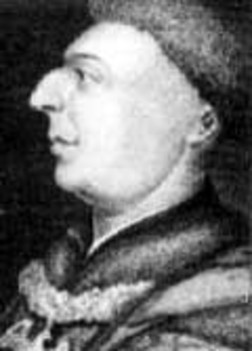 His name can be spelled 'Dunstaple' or 'Dunstapell' or even 'Dumstable' -and the New Grove lists all these alternatives in square brackets. However, he's listed in bold (meaning 'approved'!) as 'Dunstable', so that is what he gets catalogued in these parts, regardless of the fact that Wikipedia prefers the 'staple' spelling.
His name can be spelled 'Dunstaple' or 'Dunstapell' or even 'Dumstable' -and the New Grove lists all these alternatives in square brackets. However, he's listed in bold (meaning 'approved'!) as 'Dunstable', so that is what he gets catalogued in these parts, regardless of the fact that Wikipedia prefers the 'staple' spelling.
He lived around 1390 to 1453 and was recognised in his own lifetime, across Europe, as beinga somewhat revolutionary pioneer of the contenance angloise, or 'the English Something-or-Other', which was distinctive because it daringly employed harmonies with thirds and sixths (these intervals essentially having been barred from previous use because they sounded dissonant to medieval ears). Johannes Tinctoris wrote, for example, in 1477 that there was no music more than 40 years old that is 'regarded by the learned as worth hearing' and that anything written earlier was 'so ineptly composed that they offended the ear'. He went on to write that 'The English, of whom Dunstable stood forth as chief' was 'the fount and origin of the new art'.
Dunstable is therefore regarded as something of a bridge between mediaeval and Renaissance music. Nearly all his music manuscripts were lost during the dissolution of the monasteries in Henry VIII's time, but because it circulated widely in Europe in his own lifetime, it has been possible to reconstruct a reasonable amount of it from those sources.
Music Plays from my collection
(since January 9th 2021)
| Date of Play | Time of Play | Genre | Composition | Length | Play Count |
|---|---|---|---|---|---|
| Date of Play | Time of Play | Genre | Composition | Length | Play Count |